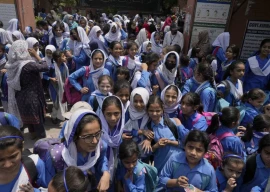
In the midst of political wrangling over Ayaz Sadiq’s controversial statement and Fawad Chaudhry’s remarks, which the Indian media cashed in on, last week, two key developments happened in our neighbourhood with serious implications for Pakistan. But since we are preoccupied with domestic issues and mudslinging, there’s no time to discuss such events either in parliament or outside. There’s no effort either on the government’s side to sensitise opposition and the people about these issues.
The first development concerns Kashmir. Despite our protests and strong opposition, the Indian government continues to implement its plan for strengthening its illegal occupation of the disputed Jammu and Kashmir region. On October 27, when Pakistan was observing Kashmir’s accession to India as Black Day, the Indian home ministry abolished a law that barred non-Kashmiris from buying property in Kashmir. Under the new law, any Indian can buy non-agricultural land in the Indian Illegally Occupied Jammu & Kashmir (IIOJK). Pakistan did condemn the Indian move but that’s all! Like the August 5, 2019 move and later new domicile law, the latest Indian decision is part of a greater plan to change Kashmir’s demographics, converting the Muslim majority state into a Hindu one. Sadly, Pakistan’s response was limited to mere statements and condemnation.
The second development is the signing of the Basic Exchange and Cooperation Agreement (BECA) between the US and India. The agreement is part of ever-growing strategic and defence cooperation between the two countries. The objective is clear: the US is deepening ties with India to counter China, which has huge implications for Pakistan. The Foreign Office reacted to BECA and said this would only disturb regional peace.
BECA will help India get real-time access to American geospatial intelligence that will enhance the accuracy of automated systems and weapons like missiles and armed drones. Through the sharing of information on maps and satellite images, it will help India access topographical and aeronautical data, and advanced products that will aid in navigation and targeting.
This is the third such agreement. In 2016 and 2018, the US and India signed the Logistics Exchange Memorandum of Agreement (LEMOA) and Communications Compatibility and Security Agreement (COMCASA). LEMOA, as reported by The Indian Express, allows US and Indian militaries to replenish from each other’s bases, and access supplies, spare parts and services from each other’s land facilities, air bases, and ports, which can then be reimbursed. “LEMOA is extremely useful for India-US Navy-to-Navy cooperation, since the two countries are cooperating closely in the Indo-Pacific. To put the usefulness of this agreement in simple terms, it is like being able to stop at a friend’s garage or workshop to refuel your car or get it repaired when you are far away from your own home or workshop,” the newspaper reported.
COMCASA allows the US to provide India with its encrypted communications equipment and systems so that Indian and US military commanders, and the aircraft and ships of both countries, can communicate through secure networks during times of peace and war.
These two developments have a direct bearing on Pakistan’s national security and foreign policy. But because of the political acrimony between the government and the opposition, there was no proper debate on these issues. It’s time to separate domestic political issues from key national security matters. For that, the political temperature has to come down. The opposition has to play cool but more than that the government needs to show magnanimity and invites its opponents for meaningful dialogue. Else this squabbling will only hurt Pakistan!
Published in The Express Tribune, November 2nd, 2020.
Like Opinion & Editorial on Facebook, follow @ETOpEd on Twitter to receive all updates on all our daily pieces.












1734511806-0/Untitled-design-(5)1734511806-0-270x192.webp)
1734468458-0/Copy-of-Untitled-(50)1734468458-0-270x192.webp)






COMMENTS
Comments are moderated and generally will be posted if they are on-topic and not abusive.
For more information, please see our Comments FAQ